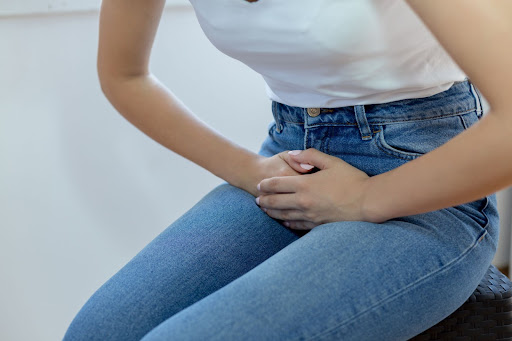Blog
What is cystitis?

In this blog, we explain exactly what cystitis is and describe the main symptoms of this condition, before focusing on a range of the most common causes and diagnosis tests. Read on to find out more.
Is cystitis a UTI?
Although not always the case, bladder inflammation diagnosed as cystitis is usually caused by a bacterial infection in the bladder, also known as a urinary tract infection (UTI). When this is the case, seeking treatment is important. As well as being irritating and painful, if bladder infections of this type are not properly treated, the infection can spread to the kidneys and become a serious health problem.
However, it is also important to understand that cystitis is not always caused by a UTI. Although less common, bladder inflammation and cystitis can also occur when your body reacts badly to certain medications or treatments, including some antibiotics and radiation therapy, as well as some hygiene products. Common triggers include feminine hygiene spray and gels, lubricants and spermicidal jellies. Additionally, in some cases cystitis may also happen as a complication of another illness, for example, diabetes, kidney stones or a spinal cord injury.
Can men get cystitis?
While cystitis is usually experienced by women, it can also affect men. However, as this is a much less common condition for men, it is advised that medical attention should be sought as soon as possible if a man believes they may be suffering from cystitis. This is because, in men, cystitis is more likely to be an indicator of a more serious problem, such as kidney stones, narrowing of the urethra, or prostate problems.
What are the symptoms of cystitis?
Symptoms of cystitis can vary from person to person, however they will tend to include all (or a selection of) the following:
- Needing to urinate more frequently
- Feeling the need to urinate after you’ve just emptied your bladder
- A low temperature (if cystitis is caused by infection)
- Strong-smelling or cloudy urine
- Blood in urine
- Cramping in lower back and/or abdomen
- Pain and/or bleeding during or after sexual intercourse
It is also important to note that if a UTI spreads to the kidneys, additional symptoms may be experienced. These may include:
- Nausea and vomiting
- Stabbing pains in back, side or abdomen
- Fever and chills
What can cause cystitis?
As touched upon above, cystitis has a number of different causes. These possible causes include:
- Urinary tract infection (UTI)
The most common cause of cystitis, UTIs typically occur when harmful bacteria enter the urethra. UTIs can also happen when the bacteria that naturally grows inside your urinary tract becomes unbalanced.
- Certain drugs
As mentioned above, some medications can cause bladder inflammation and cystitis. This is because all oral drugs travel through your body and exit through your urinary system, and this can occasionally cause irritation. For example, chemotherapy drugs cyclophosphamide and ifosfamide often cause cystitis.
- Radiation treatment
Radiation treatment is used to shrink tumours and destroy cancer cells. However, it can also irritate healthy cells in the process. For this reason, when radiation therapy is used on the lower body, bladder inflammation and symptoms of cystitis are common.
- Irritating hygiene products
Certain hygiene and sexual health products, including feminine hygiene washes, lubricants, spermicidal jellies and even concentrated bubble bath, can irritate your uretha and bladder.
- Complication caused by another illness
Sometimes cystitis simply occurs as a result of another, typically more pressing, medical condition. For example, conditions such as kidney stones, long term spinal injuries, diabetes, prostate enlargement and HIV can all cause cystitis.
Can stress cause cystitis?
There is no evidence to suggest that stress itself can cause cystitis. However, there is a link between chronic stress and weakened immune systems. This means that if your immune system is weakened, you may become more vulnerable to infection, including UTIs that can produce symptoms of cystitis.
How to diagnose cystitis
If you are concerned that you are experiencing symptoms of cystitis, you should speak to your GP or another healthcare professional. While some cases of cystitis may be diagnosed by discussing a patient’s symptoms and checking their medical history, others may require a diagnostic test to confirm. There are three tests used to diagnose cystitis. These are:
- Urine sample tests
Usually the first test used to diagnose cystitis, urine samples can be used to determine whether harmful bacteria, blood or pus is present. If this is the case, a bacterial culture test can be ordered to help confirm or rule out a UTI.
- Cystoscopy
This test is used if no bacteria is found using a urine sample but symptoms persist or cystitis becomes a recurring condition. During this test a cystoscope – a thin tube with a camera attached – is inserted through the urethra and into the bladder. This enables a doctor to inspect your urinary tract for signs of disease or infection. A small sample of tissue (biopsy) may also be taken for lab analysis.
- Imaging
Rarely needed, imaging can be used if other methods of diagnosis have failed. Ultrasound images or x-rays can help to identify unusual causes of bladder inflammation, including tumours or structural abnormalities.
What to do when you have cystitis
If you believe you may have cystitis, the best course of action is to drink plenty of water and take painkillers such as paracetamol and ibuprofen. However, if symptoms persist for more than 24 hours, you should seek medical advice from your GP or a trained pharmacist. As discussed above, in some cases antibiotics may be required.
